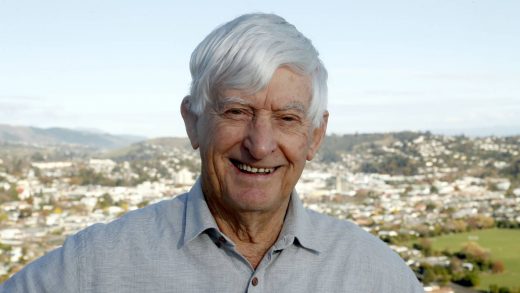:format(webp)/https://www.thestar.com/content/dam/thestar/entertainment/music/2022/06/03/ewan-currie-of-the-sheepdogs-talks-about-some-of-the-inspiration-for-new-album-outta-sight/_1the_sheepdogsa7739_photo_credit_mat_dunlap.jpg)
Ever since the boogie rockers exploded into the mainstream by winning a Rolling Stone cover competition 11 years ago, Sheepdogs Ewan Currie, Ryan Gullen, Sam Corbett, Jimmy Bowskill and Shamus Currie haven’t looked back.
Ewan Currie said he’s still a little surprised that his band — which released its seventh studio album, “Outta Sight” on Friday — was victorious, since the three-time Juno Award winners embrace a guitar-driven, classic ’70s rock esthetic that was out of line with the alt-rock sound of the times.
“It shone a light on us back in 2011 and I didn’t know how available that spotlight was going to be for a band of our style, you know?” said Currie over the phone from Hondarribia, Spain, where the band kicked off its European tour.
“We’re pretty firmly living in the past musically and we like that. We just did what we do and despite rock ’n’ roll not being the big, dominant art form that it once was in the music world nowadays, there are tons of people out there that love listening to guitar-driven rock with melody and harmony.”
Case in point, the new album, a varied 10-song take on a vein previously mined by the likes of ZZ Top, Creedence Clearwater Revival, the Allman Brothers Band and Lynyrd Skynyrd, but freshened as only the Sheepdogs can do it: meaty double guitar leads, blasts of organ and electric piano; a chorus of strong harmonies and hook-filled songs that have lyrical substance under what seems to be a lighter-hearted exterior. There’s the bright sonorous rock ode “Here I Am”; the anthemic “Find the Truth,” a powerful blue-collar Southern rock-influenced plea for more “God Damn Money” and the album-ending “Roughride ’89,” which throws a little two-step country music accelerant into its finale.
There are also some soft moments: the reflective “Mama Was a Gardener” and “So Far Gone,” a shuffle powered by a drum machine that Currie admits is a direct homage to the late singer-songwriter J.J. Cale and his laid-back Oklahoma style.
“I’m a big J.J. fan,” said Currie. “He was one of my go-to guys to listen to for any occasion and he always used those drum machines a lot. About halfway through the pandemic I bought the same drum machine that he had, a bass-tone rhythm ace that I bought off a lady in Toronto.
“I was doing a lot of recording and writing by myself, as we were all doing the isolation thing. It was a good way to have a drummer with you. Just having a beat. But it’s weird, because these drum machines, they’re not unlike — remember those organs that your grandmother had, where there’s a little drum pre-sets and you can get a bossa nova or cha cha cha beat?
“The J.J. thing was very much like ‘Call Me the Breeze’ but I figured we could kind of like do a half-homage, half-take it in a new direction. But it’s pretty obvious: that drum beat, that same tempo, that sort of shuffling guitar stuff, there’s no really escaping the sonic territory that we’re dabbling in there.”
A move to a place in the east end — Currie’s been living in Toronto for eight years, and keyboard playing brother Shamus and bassist Ryan Gullen are also residents — prompted the song “Scarborough Street Fight,” though he admits the song’s lyrics are more from imagination than reality.
“I was just lying in my bed one night after I moved across town,” Currie explained. “I’m not in Scarborough, but I live closer to it, so I took a little artistic licence.
“I heard people yelling — it was like an altercation — probably just people coming out of a bar, but in my half-awake state I sort of envisioned this street brawl and that was the lyrical content.
Official visualizer for “Scarborough Street Fight” by The Sheepdogs from the upcoming album “Outta Sight” out June 3rd
“And then that riff of the song; our sound tech, Mark, he couldn’t find work during the pandemic so he started building amps. He brought me one to the studio, and I started playing it and the first riff I started improvising was ‘Scarborough Street Fight.’ I thought it reminded me of Faces, kind of a real Ronnie Wood muscular riff, and I like the hijinx and street-fighting kind of vibe.
“When my axe spat out this riff, all of a sudden I stopped caring about the amp, took my phone out and recorded the riff. That’s when I knew it was good. I thought, ‘I gotta record this or I’ll forget it.’”
The album also shows off the tremendous six-string and multi-instrumental skills of Jimmy Bowskill who, Currie said, since joining the band for the “Future Nostalgia” tour, has added a needed dimension to the overall Sheepdog sound, not only with his fretwork, but with mandolin and violin.
“First and foremost, he was the badass lead guitar player we never had,” Currie said of Bowskill.
“He can play all the styles of the bands that we love. He always had that, you know, be it Joe Walsh or Jimmy Page or Duane (Allman) or Dickey (Betts) you’ve got to have that guy who can really play that lead.
“I know he was a blues prodigy when he was a kid, but he knows all types of music, too. He’s so smart when it comes to country and bluegrass music and traditional and roots. He can do it all and then, to top it off, he’s just like the best dude.”
As with every other musician, the Sheepdogs are glad to be back playing in front of audiences — although they did manage to squeeze in four nights at Lee’s Palace in between lockdowns.
Currie said life during the pandemic wasn’t necessarily horrible.
“To be perfectly honest, for the first couple weeks I was a little relieved,” Currie admitted. “I’m totally good to stay home a little while and have a forced vacation. I think it’s in my psyche that when we get done our regular 18 months of touring following a record release and it’s time to relax, I always feel guilty that we’re not on the road.”
During the lockdown they also performed the occasional drive-in show.
“I hate ’em, they’re terrible,” he said. “It was better than nothing, but people sitting in their cars listening to you play through the radio, while outside the car they can hear a really bad stage mix and then the (sonic) delay, it’s terrible. And no one’s making any money out of it either because of crazy overhead.
“People ask us all the time what the best style venue is and it’s any venue that’s slightly overfilled with people. That rock experience and that kind of crazy energy of just being in a room where everyone’s just ready to burst,” he said.
The boys are experiencing plenty of that crazy energy on their current European jaunt, and Currie noted there is a distinct difference between North American crowds and those across the Atlantic.
“We ended our last European tour here in Hondarribia and it was the last show of the tour, we were really tired and the show wasn’t until 12:30 a.m.
“We were trying to get the energy up and the crowd was so passionate. We were playing our song ‘Nobody,’ which has a memorable riff to it, and the crowd was chanting it almost like a soccer crowd. It was such a lift and it was really putting a smile on our faces because it’s the type of thing that North American crowds don’t typically do.”
Currie reported that despite lost time on the road, the Sheepdogs have lost none of their momentum as crowds are turning out in droves to see them.
“Before the pandemic, we had started to make some gains,” he said. “We were very slowly building things up in the U.K. and Europe. Now we have sold-out shows and just seeing that after a two-year gap, it wasn’t like, ‘Oh, who are you guys again?’ We still have that momentum.”
JOIN THE CONVERSATION
:format(webp)/https://www.thestar.com/content/dam/thestar/entertainment/music/2022/06/03/ewan-currie-of-the-sheepdogs-talks-about-some-of-the-inspiration-for-new-album-outta-sight/_3066.jpg)


